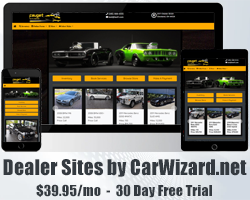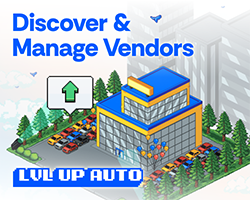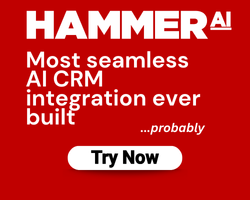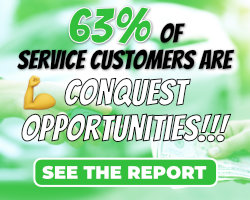This will be a series of articles because buying a CRM is a massive undertaking. It requires a lot of research and it requires knowing exactly what you want. This series is not intended to help bolster anyone’s sales or to paint something in a good or bad light. I wrote these articles to help dealers know what a CRM is supposed to do and how to pick one.
 There are a lot of opinions surrounding CRM and how it should be approached; this is just mine. There are also a few good resources you can turn to for help in either getting back to using your current CRM better or finding a new CRM. Autobase has a book called Seven Months to CRM Greatness that I hope they’d send to you if you reached out to them (it is a bit dated and 101, but it is something to get started with). Consultants like David Kain, Jennifer Suzuki, and Joe Webb are fantastic resources when it comes to CRM. These people work with a bunch of different systems and usually know a great deal about each one. Your current provider’s support and account management/training staff is also a great resource for redeploying or advancing your current CRM solution.
There are a lot of opinions surrounding CRM and how it should be approached; this is just mine. There are also a few good resources you can turn to for help in either getting back to using your current CRM better or finding a new CRM. Autobase has a book called Seven Months to CRM Greatness that I hope they’d send to you if you reached out to them (it is a bit dated and 101, but it is something to get started with). Consultants like David Kain, Jennifer Suzuki, and Joe Webb are fantastic resources when it comes to CRM. These people work with a bunch of different systems and usually know a great deal about each one. Your current provider’s support and account management/training staff is also a great resource for redeploying or advancing your current CRM solution.
I hate to say this, but I have been through a lot of CRM sales pitches and in 90% of the experiences I’ve had the sales representative was not working in my best interest. If this series does its job you will know what to look for the next time you are sitting down with a CRM sales representative.
Let’s get this introduction really started.
What is a CRM system?
A Customer Relationship Management system helps to keep you focused on your customers by enforcing process. In a basic nutshell it is a system that tells you “who to call when.” Stepping outside those boundaries is where CRM systems begin to get more sophisticated. It is also a database of your customers that organizes their information in ways that aid in your marketing and decision making efforts.
Three parts to a CRM system:
You should understand that there are three parts to a CRM.
- Process enhancement. I would argue this is the most important part of a CRM. You move the needle in your store by working one-to-one communication based on employees following process guidelines.
- Marketing abilities. A CRM can be used to send bulk emails, push advertising phone calls for your staff to make, and export a list of customers for mailers or for external call centers to call customers. Some get a bit more fancy in this area.
- Decision making capabilities. This mostly boils down to reports and dashboards, but it is simply the system providing data that allows you to make better decisions.
Why are most CRM options from automotive-specific vendors?
There are many CRM companies supplying the rest of the world with solutions like Sugar and SalesForce being examples of the bigger ones. I bet a few of the automotive CRM companies use a non-automotive-specific CRM within their own sales departments. Many of these non-automotive CRM’s focus on Business to Business (B2B) stuff while dealerships are Business to Consumer (B2C) organizations. The models for each are quite a bit different. That’s not to say there aren’t B2C solutions outside automotive; there are tons! Automotive is a tough nut to crack and almost a fraternity. But that still isn’t good enough reason why.
What makes automotive CRM so different?
One major thing is that it is so difficult to transact with dealership DMS systems. Outside of automotive these are commonly referred to as ERP systems, but there isn’t a stranglehold on them like there is in automotive. There are also things like manufacturer certifications and what not, but they’re much easier to work with.
Outside of integrations and certifications, we have different process demands as the level of communication between a dealership and a consumer vs. something like Best Buy and a consumer are vastly different. Also within our process we have what the outside world would call two different quote tools. One is a quote tool that may be used for email communication once an Internet Lead comes through and another quote tool is something we call a “pencil tool.”
Then we’ve got that complex monster that is constantly shifting, and usually late to be updated when new models come around, called inventory.
Then our language comes in. In order to build software you should start and finish with something called an object model and that requires a precise vocabulary. I won’t get into the details of an object model, but I can tell you our vocabulary is all over the place. What we call a lead, a client, a customer, a phone-up, a floor-up, etc can all mean the same thing to us; these are completely different things in software definitions.
Oh yeah, one of the biggest problems in automotive is that we don’t take CRM as seriously as we should. Sorry to end on such a downer, but read Why We Suck.
We might think of ourselves as an industry that isn’t very technologically savvy, but that’s probably because we’re an industry the technologically savvy struggle to understand.
Where does a CRM system break down?
You. Most of the time you are the destroyer of your CRM. For additional reading on this topic check out Why hasn’t CRM sold me more cars? All technologies solve some sort of problem and that inherently makes each one good. Where they are bad is when they don’t solve your particular problems (we’re going to try to fix that with this series), or they don’t innovate to keep up with your advancing abilities. However, when it comes to CRM, it is more about providing your basic users (Sales Agents, BDC, Call Center, Service Writers, etc) with a schedule of things to do and a place to add to your database. If your basic users are not inputting customers and/or not calling customers then it isn’t the CRM that’s broken, it is you.
There are many times when I’ve thought simply replacing a technology will give me a fresh start and the ability to fix the problems I was currently having…..but all it really did was sweep the problems under the carpet for a few months. When those problems reappeared they were worse than ever. Good CRM utilization requires work and maybe a lot of time looking in the mirror. I just wanted to point that out before we dive into the next steps in this series. I promise the rest of the series will be more positive. I had to point out our shortcomings up front so we can all have them in the back of our head while we’re discerning what is most important to each of us in a CRM system.
How to buy a dealership CRM series:
Part 1: Introduction (this article)
Part 2: Process
Part 3: Marketing
Part 4: Decision-Making
Part 5: Conclusion









